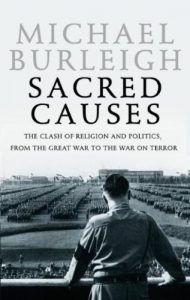 Michael Burleigh is a noted European historian, primarily known for a synthesis approach that blends intellectual, cultural and “hard” history, frequently with a heavy focus on religious and moral elements. Sacred Causes, along with its earlier companion, Earthly Powers, aspires to a synthesis of religion and politics in all of Europe, from the French Revolution to now, with a primary focus on “political religions,” ranging from Jacobinism to Islamism, that are “the abusive exploitation of the human religious sentiment.”
Michael Burleigh is a noted European historian, primarily known for a synthesis approach that blends intellectual, cultural and “hard” history, frequently with a heavy focus on religious and moral elements. Sacred Causes, along with its earlier companion, Earthly Powers, aspires to a synthesis of religion and politics in all of Europe, from the French Revolution to now, with a primary focus on “political religions,” ranging from Jacobinism to Islamism, that are “the abusive exploitation of the human religious sentiment.”
Sacred Causes covers the 20th Century, from World War One to the modern day. Much of this is well-covered ground, of course, but Burleigh brings a few new things. First, he is not anti-religious—if anything, he is pro-religion, but at a minimum, he’s pained by the facile and ignorant views of the role of religion in European history, and does his best to correct those views. Second, his intellectual sweep is so broad that he is able to illuminate many of his topics, even those that are commonplaces such as the religious aspects of Bolshevism, with new, or at least rarely expressed, insights.
Sacred Causes concerns itself heavily with the response of the organized Christian churches to 20th-century political religions. Much of this is actually not very interesting, because it tends to get bogged down in the names of people who were obscure then and are more obscure now (tempered with occasional discussions of people still relevant today, like Dietrich Bonhoeffer). Burleigh does his best to tease out, country by country, the net effect of these interactions between the organized Christian churches and the political religions in each country, but it does tend to make the reader’s eyes glaze over.
However, one particular thread, going throughout the book, on the organized Christian churches, maintains interest very well. Burleigh discusses at numerous points, each time relevant to the immediate subject matter, the role that Pius XII played in the years around World War II, both in general and with respect to the treatment of the Jews. Burleigh naturally rejects the constant libel of Pius XII, pointing out (as is not disputed) that after the war Pius was generally regarded very positively for his efforts at diplomacy, his condemnation of Nazism balanced with efforts to prevent damage to the national churches, and his active role in saving Jews from destruction. In the 1960s, with the active connivance of the anti-religious left, Communist governments planted lies, produced plays, and generally began a media campaign in an orchestrated attempt to undermine the Catholic Church’s role in captive Eastern Europe.
This took on a life of its own and is today’s Black Legend. Burleigh’s approach is weary to this, not because he is tired of the topic, but because he knows that few people have the intellectual heft or interest in learning the truth or the facts, but would rather get their facts from what “everybody knows” or mendacious tracts by James Carroll, today’s Jack Chick. Burleigh’s approach gives Pius his due, with appropriate hindsight criticism, but leaves no doubt that Pius was hardly the Hitler ally today’s anti-Catholics portray him as—and Burleigh is not afraid to draw the parallel between yesterday’s Communist and today’s libertines, both eager to discredit the Catholic Church for its opposition to their programs for their version of the New Man.
Other chapters cover topics that are not well known in the States. For example, there is significant discussion of Irish Protestant/Catholic relations, shot through with a bitter tone of “a pox on both your houses.” Burleigh touches on Mexico, with its little-known history of violent and murderous anti-clericalism; and Spain, with its better known internal trials. The second half of the book then focuses on religion under Communism, the role of religion in the collapse of Communism, and completes with a short but pessimistic view of the ability of Europe’s Muslims to come to an accommodation with a Europe weakened by the death of Christianity and the rise of relativistic multiculturalism.
One thing that strikes the modern reader is the high level of political discourse possible prior to the 1960s. For example, German society in the 1930s was full of discussion about the path forward. Max Weber is quoted as giving an extemporaneous lecture on duties to the state, in a Berlin bookstore, citing obscure verses from Isaiah from memory and using them as the central focus for a complex discussion of how to act. In counterpoint to this, the era featured numerous prophetic charlatans, a la David Koresh, using their messiah status mostly to get their disciples to sleep with them, combined with not-complex-thinking-at-all by gutter street fighters of Right and Left. We today are left with the latter two, but unfortunately have lost the first mode of discussion.
In any case, this book is not a light read. It’s easier to read with some other reference works at hand or some familiarity with the details of 20th-century European history. But it’s worth reading, because the synthesis performed really adds much to any existing knowledge of the period.
